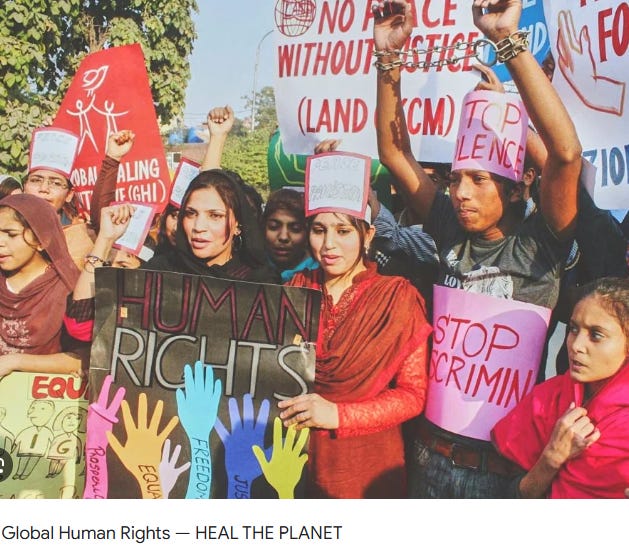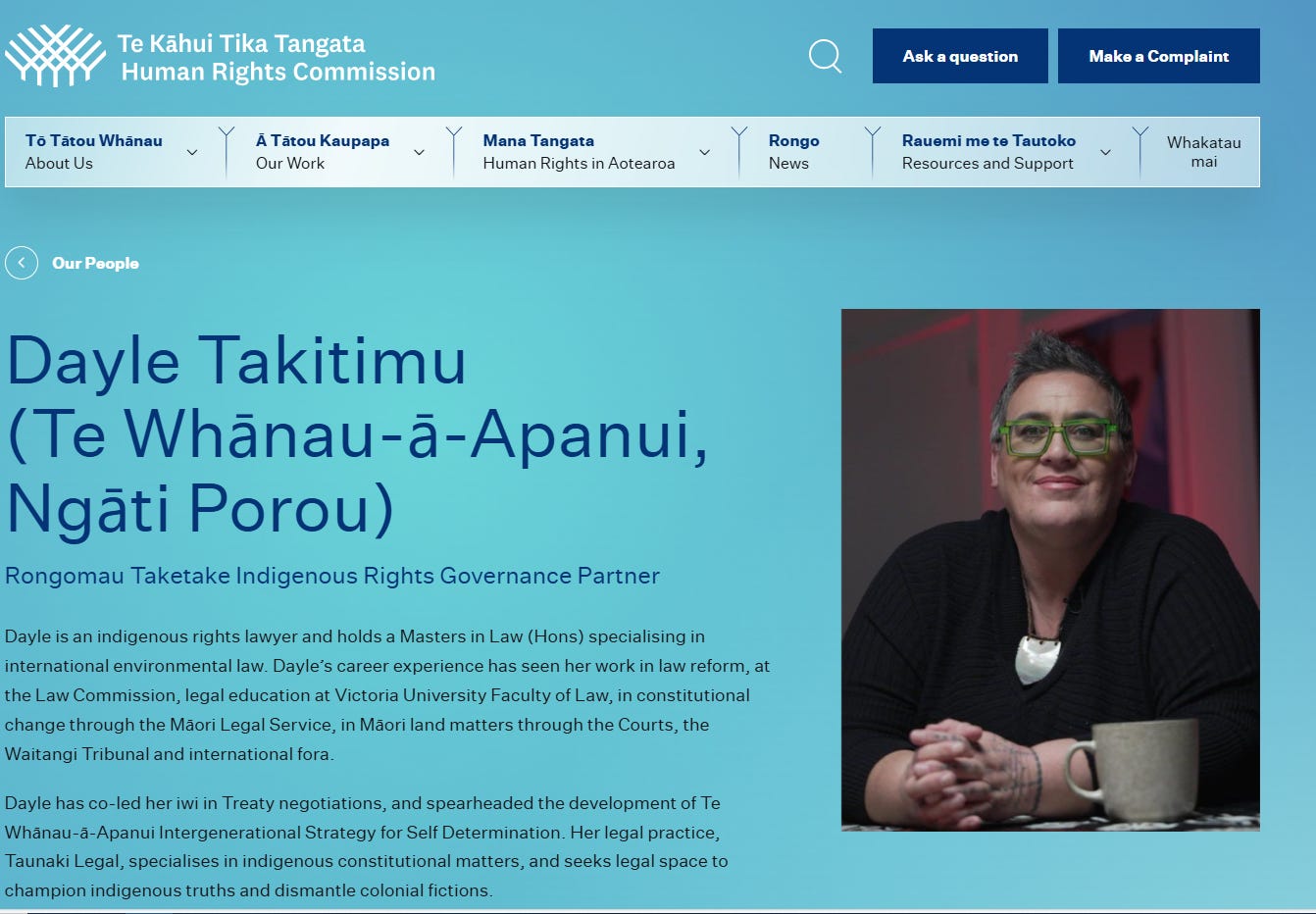No pot of human rights gold at the end of this Rainbow
About three weeks ago, New Zealand’s Chief Human Rights Commissioner, Dr Stephen Rainbow, talked to Michael Laws on webcasting media channel, The Platform. You can listen to most of the interview here (in order to listen to the full interview, become a Platform Plus subscriber):
I have previously commented favourably on my aspirational hope for New Zealanders regarding Stephen Rainbow’s appointment as Chief Human Rights Commissioner:
SOME DEAR'S OVER THIS RAINBOW
John McLean 6 May
SOME DEAR'S OVER THIS RAINBOW
John McLean 6 May

On 24 February 2025, NZ Human Rights Commissioner Stephen Rainbow courted controversy. Rainbow’s remark came at a meeting between himself, Race Relations Commissioner Melissa Derby, two Human Rights Commission staff and feisty Philippa Yasbek. It came in response to Yasbek proclaiming that white supremacists are the greatest threat to the Jewish communi…
Read full story
But I now struggle to embrace this Rainbow. I “feel” (feelings being paramount these days) a forlorn deflation. I’ve lost confidence that Dr Stephen is genuinely intent on getting the HR Commission back on track to properly champion true equality of non-discriminatory human rights.
The Rainbow approach to human rights
When Laws asks Rainbow what the HR Commission does, Mr Rainbow gleefully asserts his conception of the Commission’s “foremost” responsibility. The HR Commission’s primary duty, according to Rainbow, is to ensure that New Zealand complies with the international human rights treaties that the country has signed up to, in order to implement (his words) “the whole UN system”.
Rainbow’s personal belief that the HR Commission’s overriding obligation is to ensure compliance with international human rights treaties is revealing - and damning.
Many of the human rights treaties that New Zealand has committed itself to go much further than requiring signatory nations to simply ensure that individuals do not suffer discrimination based on their sex, religious or ethical belief, skin colour, race, disability etc. These treaties require positive State-sponsored discrimination (affirmative action) in favour of specific select groups i.e. precisely the discrimination that the US Supreme Court has decided is unconstitutional, in that Land of the Free.
The UN Convention on the Elimination of All Forms of Discrimination Against Women requires signatory States to take affirmative action to promote gender (i.e. biological sex) equality, including specifying that special measures aimed at engineering equal outcomes for men and women are not discrimination. The International Convention on the Elimination of All Forms of Racial Discrimination requires signatory countries to take special measures to ensure adequate development and protection of indigenous people. The UN Declaration on the Rights of Indigenous Peoples (the UN declaration that spawned New Zealand’s racially separatist He Puapua report) entrenches rights for indigenous people to enjoy discrimination to ensure their rights are protected and their cultures are preserved. And so on…

Globalists naturally defend the significant extent to which international treaties impinge on New Zealand’s democratic sovereignty. Their defence often involves an assertion that international treaties to which New Zealand is a signatory only affect New Zealanders if (and to the extent that) what they say is incorporated in New Zealand legislation. Which is all very convenient, and evasive. Because the Human Rights Act is littered with incorporation of international human rights laws, including the following sly infiltrations:
The Commission has…the following functions…
to make public statements in relation to any matter that may affect or infringe human rights (whether or not those human rights are affirmed in New Zealand domestic human rights law or international human rights law), including statements commenting on the position of the Government in relation to that matter
to report to the Prime Minister on…action to…ensure better compliance with standards laid down in international instruments on human rights
to promote the development of new international instruments on human rights
to promote and monitor compliance by New Zealand with, and the reporting by New Zealand on, the implementation of international instruments on human rights ratified by New Zealand
Old fashioned universal human rights
Stephen Rainbow could just as justifiably have told Michael Laws that the HR Commission’s primary role is to ensure that New Zealanders are not discriminated against based on the “prohibited grounds of discrimination” prescribed in the Human Rights Act i.e. discrimination based on their sex, marital/civil union status, religious or ethical beliefs, skin colour, race, ethnic or national origins, disabilities, age, political opinions, family status or sexual originations. This is the discrimination that Martin Luther King railed against.

But Rainbow doesn’t regard protection from discrimination as the HR Commission’s primary role. Rainbow revealed that the current HR Commission views itself as an activist agent of social change, working to re-construct New Zealand society based on his own conceptions of which particular groups deserve a special leg up. In short, this is the Identitarian (Woke) approach to human rights.
In the New Zealand context, this authoritarian “equal outcomes” approach to human rights means giving special preference to individuals with Māori ancestry. And in deference to Mr Rainbow, the Human Rights Act provides that the functions of the HR Commission include “to promote by research, education, and discussion a better understanding of the human rights dimensions of the Treaty of Waitangi and their relationship with domestic and international human rights law” (a provision inserted in 2016, under the National Party-led Government).
Furthermore, in appointing Human Rights Commissioners, the Human Rights Act provides that the Minister of Justice (currently, Paul Goldsmith) must have regard to the need for Commissioners to have among them “knowledge of, or experience in…the Treaty of Waitangi and rights of indigenous peoples”.
Towards the end of the Laws/Rainbow korero, Human Rights Reverend Rainbow heaps hagiographic praise on the HR Commission’s “Rongomau Taketake Indigenous Rights Governance Partner”, a woman by the name of Dayle Takitimu:
Dayle is as extreme as a radical Māori activist separatist can be.
The HR Commission remains radically Māorified.

Click to view
But New Zealand’s State-sanctioned Identitarian approach to human rights is not confined to the Māori “thing”. New Zealand’s human rights institutions are riddled with radical Woke ridiculousness.
The Human Rights Review Tribunal is the quasi-Court that adjudicates on alleged breaches of the Human Rights Act. The Tribunal is currently in the process of dealing with a complaint by Lesbian Action for Visibility Aotearoa (LAVA). LAVA has formally complained that Wellington Pride breached the LAVA ladies’ human rights by refusing LAVA’s application for a stall at Wellington Pride’s 2021 “Out in the City” fair. Pride excluded LAVA for LAVA’s audacious claim that men are not, and cannot become, women (lesbian or otherwise).

The Tribunal’s hearings are a public forum but Tribunal Chair, Sarah Eyre, has purported to ban long-time journalist Jenny Ruth from attending the hearing on the basis that only “accredited journalists” can attend the hearing and report on its proceedings.
There’s no legal definition of an “accredited journalist” and Jenny’s only “crime” is that she doesn’t subscribe to what Jenny rightly describes as the “genderwoo” (the nonsense that humans can literally change their biological sex). Chair Eyre has said it’s up to the Police whether to criminally charge Jenny with contempt of court - as if Jenny has actually committed a prosecutable crime.

Eyre has plunged the whole hearing into absurdity, including personally scolding LAVA’s lawyer, Nicolette Levy KC, for “misgendering” some participants in the farcical hearing i.e. using pronouns consistent with participants’ biological sex. Make no mistake Sarah Eyre, you and your bizarre Star Chamber Tribunal deserve all the contempt you and your Kangarights Court get.
The discerning reader may well wonder how Māori preferential entitlements to such things as entry to New Zealand medical colleges do not constitute prohibited discrimination on the basis of race, under the Human Rights Act. After all, given spaces at medical colleges are as scarce as hens’ teeth, allowing individuals with any fractional Māori ancestry to enter medical colleges with inferior academic credentials necessarily excludes more qualified non-Māori individuals who lack such qualifying ancestry.
The answer lies in section 19(2) of New Zealand’s Bill of Rights Act, which contains an exception to the right contained in section 19(1) that “Everyone has the right to freedom from discrimination on the grounds of discrimination in the Human Rights Act”. The exception is as follows:
Measures taken in good faith for the purpose of assisting or advancing persons or groups of persons disadvantaged because of discrimination that is unlawful by virtue of Part 2 of the Human Rights Act 1993 do not constitute discrimination.

The section 19(2) exception is the Trojan Horse that allows New Zealand’s endemic race-based preferences and other unmeritocratic discrimination.
If New Zealand’s current Government is to try and remain in power after the next general election, it will need to take powerful symbolic actions that demonstrate its commitment to equal citizenship - a nation human-rights blind to race, ethnicity and sexual orientation. If the Government has that necessity in mind, it could usefully start by repealing the discrimination-endorsing section 19(2) of the Bill of Rights Act.
John McLean is a citizen typist and enthusiastic amateur who blogs at John's Substack where this article was sourced.



3 comments:
Who appointed Rainbow and co? Goldsmith ( on Luxon's orders).
He Pua Pua is bound to advance. Say no more.
The HR Commission needs to go, along with Broadcasting Standards Authority. These organisations aren’t supporting New Zealanders, they’re dictating to us. The bureaucracy is not serving the people. The people (- and the Parliament?) are serving the radical leftist bureaucracy. Bring back neutrality in the public service and put NZ law ahead of UN dictats.
Well said thank you
Post a Comment
Thank you for joining the discussion. Breaking Views welcomes respectful contributions that enrich the debate. Please ensure your comments are not defamatory, derogatory or disruptive. We appreciate your cooperation.